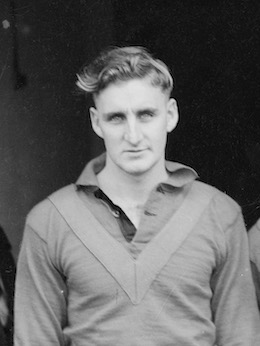|
HALL OF FAME INDUCTEE John William LOUGHRIDGE |
|
|---|---|
| Year Inducted | 2019 |
| Date of Birth | 14th February 1923 |
Player 1945-1950
Games 136 (West Perth 126, WA 10)
Goals 42 (West Perth 42, WA 0)
Honours: Sandover Medal 1946, Runner Up 1945; Simpson Medal 1946 (Grand Final); West Perth premiership player 1949; West Perth Fairest and Best (3) - 1945, 1946, 1949; West Perth FC Life Member (1955); West Perth Team of the Century (2000).
A great centreman in an era of great WA centremen, John Loughridge amassed a record of achievement in a six-season league career unmatched by many great players with far longer careers at the top. As a champion schoolboy footballer, he was always destined for stardom but the intervention of World War 2 delayed the commencement of his league career until age 22 and work commitments as a travelling salesman cut his career short at age 28. But as a Sandover and Simpson Medal winner, three-time club fairest and best winner and state representative on multiple occasions, he was a mandatory selection in the West Perth Team of the Century and unquestionably one of the great WA players of his era.
John William Loughridge was born in Subiaco in 1923 into a football family, his father Bill having played more than 100 league games with East Perth, Midland Junction and Subiaco. John first gained attention by achieving selection in the WA state schoolboys team at the age of only 12 in 1935. He followed this up with selection again in both 1936 and 1937. His achievement of selection in three successive state schoolboys’ teams was not equaled for more than 30 years.
Playing with Mount Hawthorn in 1938 aged 15, Loughridge again distinguished himself, twice winning the club best and fairest award and holding the positions of vice-captain and captain. At this time, his raking dropkicks were described as “unusual in their assurance, length, and general style for one of his years” although he was later not regarded as a long kick in league ranks.
Loughridge seemed assured of joining West Perth’s league ranks but the suspension of the WAFL league competition to be replaced by an age restricted competition in 1942 cost him three seasons. His age exceeded the underage limit by 18 months and John played only a few games in an overage competition until 1945 when open football recommenced and he went straight into the West Perth senior team as vice-captain.
Playing in various positions Loughridge had a brilliant first league season winning his club fairest and best award and being runner to George Bailey for the Sandover Medal. New coach Ross Hutchinson established Loughridge as a permanent centreman in 1946, and in what was his best season in league football, Loughridge won the Sandover Medal, Simpson Medal for a brilliant display in a losing Grand Final against the undefeated East Fremantle team, and again collected his club award.
Contemporary accounts described Loughridge as a scrupulously fair player and a brilliant and instinctive ball winner, a ground player par excellence who had an uncanny ability to trap the ball, swerve around or sidestep an opponent and deliver the ball with a beautiful drop kick into the forward line.
Loughridge continued to play with a high level of consistency, capturing a third fairest and best award in 1949 and a premiership win with his club. He gained state selection for games against Victoria and South Australia and also played seven times for WA second 18 teams against visiting VFL teams.
In a non-professional era however, work commitments forced Loughridge to place family security before football and he retired at the age of 28 due to work commitments. John Loughridge was not lost to football however, serving on the West Perth committee from 1952 to 1957 and intermittently as a broadcaster. He was the driving force behind the Sandover Medallists’ club, serving as its president until his early death from a brain tumour in 1981. He was only 58 and remembered by many as one of the game’s great personalities and friends.
In joining the WA Football Hall of Fame, John Loughridge joins several direct opponents and adds lustre to both his own achievements and a great postwar era in WA football.


